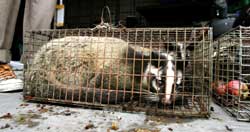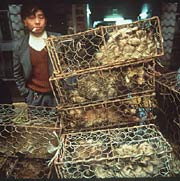I was lucky to see John Pomfret, former bureau chief of the Washington Post’s Beijing office, address a group in Scottsdale last week. I was scribbling notes the whole time and now I’m finally going to decipher them. I was also lucky to spend some time with John afterwards at a local bar with my first cousin, who was John’s friend at Stanford. (Sorry, but I promised not to blog about our conversation at the bar.)
I always thought John was the best of the Beijing correspondents, followed by Joseph Kahn. John is now moving to Los Angeles, where he’ll be the new WaPo bureau chief. (His replacement in Beijing, Phillip Pan, is also doing an awesome job.) What I liked most about John was his honesty and courage. More than any other foreign correspondent in China, he wrote about the really controversial issues — Ma Shiwen, evictions of peasants who were thrown on the street, the SARS ambulance story (which he broke) — he wasn’t afraid to say what the government was doing and how bad some of those things really were.
That same honesty permeated his talk in front of an ultra-conservative group of lizardy gazillionaire businessmen.
“The longer I lived in China,” he began, “the less I came to believe China is really a great nation in the making.”
Now, I have to make it clear that he was not in any way slamming China. He was setting the stage for explaining just how tough China’s problems are, and that Westerners, immersed in romantic depictions from starry-eyed visitors, have no idea what kind of challenges China is facing.
This was at the heart of Pomfret’s talk: the West badly misunderstands China’s economic, medical, political, social and environmental hurdles. He was particularly emphatic that there is no need for the West to fear China becoming a global superpower along the lines of the USA. “Not all of China�s dreams are going to be achieved because hard-wired into their DNA are serious constraints that will keep China from becoming what it aspires to. Most of China is a third-, fourth- and fifth-world country” under constant threat from unimaginable poverty, so many people to employ, AIDS, a devastated environment, etc.
Last year the number of people living below the poverty line in China grew by some 800,000 people, he said, at the time of the nation’s great economic miracle. The wealth gap is simply too staggering for most Westerners to envision. He said one way China is trying to offset the people’s anger is by inciting nationalism (an old trick in China, used to masterful effect by Deng after Tiananmen Square).
“But the nationalism we are seeing is only skin-deep,” Pomfret said. “Michael Jordan retired is more popular among Chinese citizens than Yaoming. All the Chinese young people want to work for US companies and own US goods.” They know their futures and their salaries will be far more limited at a state-owned business, he said.
He later repeated his metaphor when he said “serious constraints are hard-wired into the Chinese DNA and the Chinese political, economic and social system that could stop China’s meteoric rise.” The major constraint, he made it clear, is corruption, which seems to make things work in the short term, but which could help unravel China’s great success over the long term. He praised this success again and again, but said the CCP is caught in a conundrum of failing to address how a single party can control absolutely everything when absolutely everything is changing right underneath its feet.
I was surprised at just how hopeless Pomfret views so many issues in China. For example, when someone asked about Chinese-Japanese relations, he described it as a “Gordian knot with no solution in sight. Relations between them won’t get better anytime soon, but there won’t be any war.” He added that the CCP uses this issue to unify the country, appealing to the masses’ raw emotions.
He also echoed a point that several bloggers have made, namely that the war on terror has been “a windfall” for China in every way. “From the Chinese perspective, it diverted the attention of those Republicans who saw the PRC as a competitor and a threat, and it focused them instead on the Middle East. Now China can crack down on radical Islam in Xinjiang and Americans don’t say anything. There will be many more executions — the Chinese will just crush these people.”
Contrary to the article in the Atlantic I linked to Friday, Pomfret say relations between Taiwan and China won’t degenerate into war. “The US won’t let Chen Sui Bian go too far off the rail. China understands that the key to Taiwan’s not declaring independence is Washington. And China uses the issue to win hearts and minds at home. In a way, it benefits from the continual bad relations.”
He was critical, too, of the CCP’s treatment of HK, but most of you know the story so I won’t write down all he said. Money quote: “They’ve given a lot of benefits to Hong Kong on the economic side, playing to the people’s love of money. But in the long-term, the conflict is an ominous development. Now, China is a potential enemy to Hong Kong, when before [HK protested] they were considered a friend.”
China’s military is another example of Westerners seeing more than is really there, John said. “It has pockets of excellence, including great missile technology, but all in all it is still a middling power.” He added that any invasion of Taiwan would be all but impossible, if only because of Taiwan’s lack of beaches. “It would end up being a million-man swim…Many military people say that China is nowhere near ready to threaten Taiwan. There’s huge military spending, but in terms of bang for the buck, what they’ve got just isn’t that significant.”
This was in many ways a sad talk. What China dreams of being simply isn’t coming anytime soon and probably not ever. “They want to be seen as a great country, as a good country….but I am a cautious pessimist.” He didn’t say China was going to fail or crash — just that it’s ultimate dreams would elude it, made impossible by a harsh reality that in many ways the one-party system only exacerbates.
John made it clear how outraged he is over Joseph Kahn’s assistant in Beijing being thrown in jail for 6 to 10 years for his alleged involvement in the NY Times’ story on Jiang’s imminent resignation (which came out days before the official announcement). “He wasn’t even involved in Kahn’s story, but they don’t care about things like that. They just wanted to teach the Times a lesson.”
While critical of the CCP, John also says that under the circumstances he doesn’t know how they could do things any better than they’re doing now — but only because they created the situation in which there’s no alternative. That’s an important point: “They completely smashed the opposition so there’s no one in the wings who could replace them. If any new voice were to arise, it could be an even uglier one that what they’ve got now.” He was a war correspondent in Bosnia, and he compared China’s political situation to Yugoslavia under Tito, where one strong man crushed all the opposition and held the country together through brute force. Once he was gone, it all disintegrated.
Last of all, when asked what the Chinese now believe in, John said, “Chinese students have told me they simply have no beliefs. They have less respect for the family than earlier generations. Will there be a renaissance during which the youth of China rediscover their traditional values? I don’t see it. So many people in China live to rip other people off — this takes place on such a huge level, it’s scary. One has to worry that China is a society devoid of values.”
Yes, it was a sad talk, and there was little to celebrate. Maybe I’ll take hope in that he didn’t say China is doomed to defeat or that it will all come crashing down — only that its vision of itself doesn’t jibe with reality, and that its opportunities are more limited than they’ve led themselves to believe. And with that, I have to sadly agree.
Update: By the way, this all ties in with a good article in yesterday’s Guardian on why China’s roaring markets still don’t in and of themselves make it a great superpower. It’s really quite amazing — the author makes so many of the points Pomfret did. Thanks to the reader who alerted me. I can’t recommend it enough.
Update 2: With this post, a new commenter joined this blog named Mark Anthony Jones, and he comments at great length below. It was frustrating to later learn that literally all of his comments were cut and pasted from articles he found using Google searches. My apologies for all of those who were made fools of.


Comments